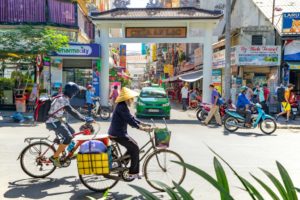
Vietnam planning its own ‘Silicon Valley’ in Ho Chi Minh City
- The municipal government of HCMC has submitted plans to develop a large tech zone, that is being dubbed the ‘Silicon Valley of Vietnam’
- 3 HCMC eastern districts will be merged under the proposed plan, which has the backing of the Vietnamese PM
Substantial city planning and expenditure will be required to attract investors, but Vietnam’s lower operational costs should help - The local government of Vietnam’s financial capital Ho Chi Minh City is forging ahead with plans to develop a large segment of the city into the first technology hub in the country.
City officials first began planning to cultivate the 22,000-hectare (54,300-acre) swath of land in 2017, according to Vietnamese news outlet VnExpress International, which will see three of Ho Chi Minh City’s eastern districts – the existing hi-tech park in District 9, the university district of Thu Duc, and the upcoming urban and financial center in District 2 – combine to form an “innovative urban area” that is being called by some as “Vietnam’s Silicon Valley”.
Following a meeting with Vietnam’s prime minister in early May this year, the city’s Home Affairs Department drew up a plan for the combined district tentatively being called ‘Eastern Town’. These plans come as Vietnam’s digital maturity continues to flourish – the country is already the third-largest e-commerce market in Southeast Asia despite limited digital infrastructure, and the Vietnamese digital economy is estimated to hit US$33 billion in value by 2025.
Originally, the plan was part of the government’s plans to turn Vietnam’s largest municipality into a smart city by 2020: leveraging scientific research and emerging technologies to resolve issues facing the fast-growing metropolis including rapid population boom, inadequate city planning and management, insufficient healthcare, public transportation, pollution management, and more.
Vietnam’s techpreneurs
Since then, the plan has developed to appeal to Vietnam’s new generation of ‘techpreneurs’: digital-focused local entrepreneurs who are starting tech companies in Ho Chi Minh City, buoyed by the lower operational costs in Vietnam, as well as the ready supply of lower-cost IT programmer and developer talent pool that has been growing in the country.
“Vietnamese are very entrepreneurial,” stated Jack Nguyen, a partner at the business advisory firm Mazars in Ho Chi Minh City. “They see something work in other countries, or in the US, they’ll give it a shot here in Vietnam.”

The area that Eastern Town is set to encompass already includes modern apartment residential tracts, parts of the city’s central business and finance sector, as well as the resources of the local polytechnic university, which locals who live in the area believe will appeal to the tech-oriented community.
Frederick Burke, a partner at the Ho Chi Minh City-based law firm Baker McKenzie believes the location convergence, as well as the incentives offered to relocate to that area, will help to spur the right talents to move to the new “city within a city” once it is up and running.
“The fact that they give extra incentives to locate there creates an ecosystem where some employees live in the neighborhood,” Burke said. “Therefore, an engineer can jump from one job to another more easily.”
The proposed development lacks a lot of support that a more developed host nation might be able to offer, such as existing high-speed internet infrastructure. But with the institutional support of the prime minister and the local government, the project stands to reinvigorate investments and interests in the homegrown technology scene.
One thing that will set apart Vietnam’s Silicon Valley from the actual Silicon Valley in California is the lack of venture capitalist presence that made the San Francisco-area Silicon Valley into a hotbed of IT innovations and capital spending, estimated at US$275 billion in annual output according to some projections.
Lam Nguyen, managing director of tech market research firm IDC Indochina in Ho Chi Minh City, said another major difference with the American Silicon Valley is that the state government will have to invest significantly to incentivize development of the tech zone, such as building out infrastructure, offering tax breaks to entrepreneurs, and providing the broadband internet bandwidth that the local authorities have already offered.
“What we’ll likely see as key differences between the two is the Ho Chi Minh City project will be a cluster that heavily recruits global and regional companies and [where] entrepreneurial behaviors are likely commissioned by the government, whereas Silicon Valley is more locally grown and has been driven by industry trends and technology innovations,” iterated Lam Nguyen.
Source: https://techwireasia.com/2020/06/vietnam-planning-its-own-silicon-valley-in-ho-chi-minh-city/
